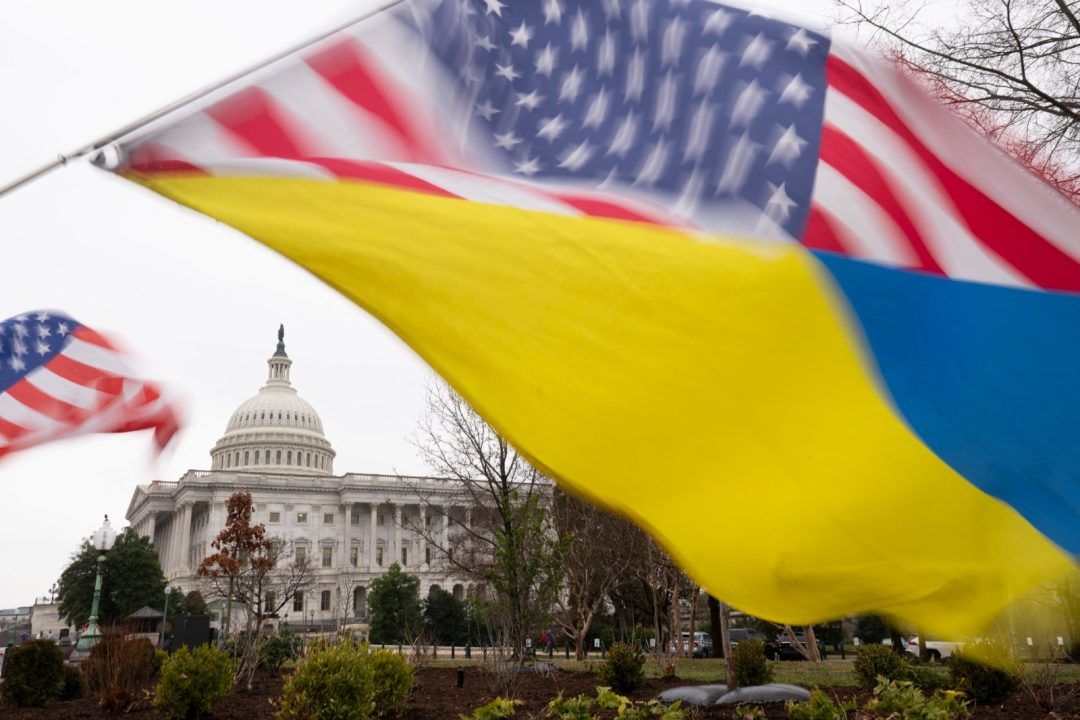- Home
- Middle East
- US Senate Approves $95 Billion Aid Bill

©(Roberto Schmidt / AFP)
The US Senate approved a bill on Tuesday that would provide Ukraine, Israel and Taiwan with a total amount of $95 billion in financial aid, amid claims of the importance of adopting an isolationist stance first and foremost.
The US Senate on Tuesday approved long-delayed funding for Ukraine's war effort, part of a foreign aid package that right-wing House Speaker Mike Johnson has indicated his Republican-led chamber will reject.
The $95 billion package includes funding for Israel's military and key strategic ally Taiwan. But the lion's share, $60 billion, would help Ukraine restock depleted ammunition supplies, weapons and other crucial needs as it enters a third year of war against Russian invasion.
The legislation, which the Senate voted on early Tuesday morning, easily passed 70-29 with cross-party support. It is the latest effort in a tortuous process to save President Joe Biden's policy of leading a Western response to the Russian attack on democratic Ukraine.
Johnson suggested late Monday that even if Republicans in the Senate back the Ukraine bill, the party in the lower house will not follow—unless, again, it comes with border control measures.
Senate Democrats, led by Majority Leader Chuck Schumer, have now set up a major showdown on the issues by getting the foreign aid bill passed and sent to the House.
"Today we make (Russian President) Vladimir Putin regret the day he questioned America's resolve," Schumer said on the Senate floor, adding that if Johnson allows the bill to go to a House vote, "it will pass with the same strong bipartisan support."
Ukrainian President Volodymyr Zelensky expressed gratitude for the advancement of the aid measure despite its uncertain fate in the House, taking to social media to thank "every US senator who has supported continued assistance to Ukraine as we fight for freedom, democracy and the values we all hold dear."
The Republican logjam over the bill comes amid both disunity within the party and desire among the right wing to keep the border an open issue leading into the election.
Given Trump's domination of the party, it meant top Senate Republican Mitch McConnell had to step out of line in marshaling support during the overnight debate ahead of Tuesday's vote.
McConnell had urged his colleagues to reject the Trump-favored isolationist approach and to consider the message it would send if the United States failed to support Ukraine and other democracies.
Trump's acolytes in the Senate, however, only highlighted the divisions among Republicans and how a significant faction of the party is turning inward.
With AFP
The US Senate on Tuesday approved long-delayed funding for Ukraine's war effort, part of a foreign aid package that right-wing House Speaker Mike Johnson has indicated his Republican-led chamber will reject.
The $95 billion package includes funding for Israel's military and key strategic ally Taiwan. But the lion's share, $60 billion, would help Ukraine restock depleted ammunition supplies, weapons and other crucial needs as it enters a third year of war against Russian invasion.
The legislation, which the Senate voted on early Tuesday morning, easily passed 70-29 with cross-party support. It is the latest effort in a tortuous process to save President Joe Biden's policy of leading a Western response to the Russian attack on democratic Ukraine.
Johnson suggested late Monday that even if Republicans in the Senate back the Ukraine bill, the party in the lower house will not follow—unless, again, it comes with border control measures.
Senate Democrats, led by Majority Leader Chuck Schumer, have now set up a major showdown on the issues by getting the foreign aid bill passed and sent to the House.
"Today we make (Russian President) Vladimir Putin regret the day he questioned America's resolve," Schumer said on the Senate floor, adding that if Johnson allows the bill to go to a House vote, "it will pass with the same strong bipartisan support."
Ukrainian President Volodymyr Zelensky expressed gratitude for the advancement of the aid measure despite its uncertain fate in the House, taking to social media to thank "every US senator who has supported continued assistance to Ukraine as we fight for freedom, democracy and the values we all hold dear."
Republican Divisions
The Republican logjam over the bill comes amid both disunity within the party and desire among the right wing to keep the border an open issue leading into the election.
Given Trump's domination of the party, it meant top Senate Republican Mitch McConnell had to step out of line in marshaling support during the overnight debate ahead of Tuesday's vote.
McConnell had urged his colleagues to reject the Trump-favored isolationist approach and to consider the message it would send if the United States failed to support Ukraine and other democracies.
Trump's acolytes in the Senate, however, only highlighted the divisions among Republicans and how a significant faction of the party is turning inward.
With AFP
Read more



Comments